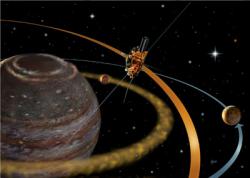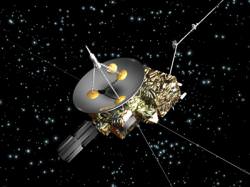“One equal temper of heroic heart
Made weak by time and fate, but strong in will
To strive, to seek, to find, and not to yield.”
—from the poem “Ulysses” by Alfred, Lord Tennyson
The Ulysses spacecraft has been heroically studying our sun for more than 17 years, almost four times its expected lifetime. But now, the mission might be finally succumbing to the harsh environment of space. Mission managers say the spacecraft will likely “die” in the next month or two.
“Little remains; but every hour is saved
From that eternal silence, something more,
A bringer of new things;
To Follow knowledge like a sinking star,
Beyond the utmost bound of human thought.”
(more from “Ulysses”)
Ulysses is a joint mission between ESA and NASA that was launched in 1990 during space shuttle mission STS-41. Ulysses was the first mission to study the environment of space above and below the poles of the Sun. The spacecraft has returned a huge amount of data that has changed the way scientists view the Sun and its effect on the space surrounding it.

Ulysses is in a six-year orbit around the Sun. Its long orbital path carries it out to Jupiter’s orbit and back again. The further it ventures from the Sun, the colder the spacecraft becomes. If it drops to 2ºC, the spacecraft’s hydrazine fuel will freeze.
This has not been a problem in the past because Ulysses carries heaters to maintain a workable on-board temperature. The spacecraft is powered by the decay of a radioactive isotope and over the 17-plus years, the power it has been supplying has been steadily dropping. Now, the spacecraft no longer has enough power to run all of its communications, heating and scientific equipment simultaneously.
“We expect certain parts of the spacecraft to reach 2ºC pretty soon,”says Richard Marsden, ESA’s Ulysses Project Scientist and Mission Manager. This will block the fuel pipes, making the spacecraft impossible to maneuver.
The ESA-NASA project team had tried to solve this problem by temporarily shutting of the main spacecraft transmitter, which would provide 60 watts of extra power that could be channeled back to the heater and science instruments. Unfortunately, the transmitter failed to turn back on.
“The decision to switch the transmitter off was not taken lightly. It was the only way to continue the science mission,”says Marsden, who is a 30-year veteran of the project, having worked on it for 12 years before the spacecraft was launched.
After many attempts, the Ulysses project team now consider it highly unlikely that the X-band transmitter will be recovered. They believe the fault can be traced to the power supply, meaning that the extra energy they hoped to gain cannot be routed to the heater and science instruments after all.
So, the spacecraft’s fuel lines are gradually freezing. This spells the end of this highly successful mission.
“Ulysses is a terrific old workhorse. It has produced great science and lasted much longer than we ever thought it would,” says Marsden. “This was going to happen in the next year or two, it has just taken place a little sooner than we hoped.”
The team plan to continue operating the spacecraft in its reduced capacity for as long as they can over the next few weeks. “We will squeeze the very last drops of science out of it,” says Marsden.
“Death closes all; but something ere the end,
Some work of noble note, may yet be done…
‘Tis not too late to seek a newer world…
To sail beyond the sunset.”
—more from “Ulysses” by Tennyson
Original News Source: ESA Press Release


Congrats Ulysses! Yet another example of how an investment in space exploration has returned far more than we had anticipated.
It’s a shame that Bush has proposed a 2009 space budged it smaller than even he had said was necessary earlier in his term. Hopefully Congress will get up the gumption to up the ante so that missions like Ulysses will continue to be launched.
R.I.P
Once the satelite has died what will happen to it? Will this be another satelite we on Earth need to be concerned about? If we do need to be considering the consequences when will the fall to Earth occur? Will the space station be in any danger? Thanks! James
What we learnt?
James M. P. , Ulysses is in solar orbit. It won’t “fall to earth”. You can relax, we don’t need to expend another Navy Standard 3 rocket.
“# James M. P. Says:
February 23rd, 2008 at 8:36 am
Once the satelite has died what will happen to it? Will this be another satelite we on Earth need to be concerned about? If we do need to be considering the consequences when will the fall to Earth occur? Will the space station be in any danger? Thanks! James
”
Nothing to worry about, in the near future anyway. Ulysses is on a highly inclined orbit that does not cross Earth’s path at all.